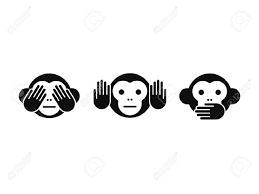Are You a Good Listener or a Good Speaker? Here's How to Be Both.
Did you know that your facial features are a good indication of your strongest sense? If you have big ears, you're a good listener. If your mouth is large, you're a great public speaker…
I'm kidding! That old folklore is absurd – but feeling connected to our stronger (and weaker) senses can be incredibly helpful.
As a therapist, I constantly need to incorporate all of the senses. But most importantly, I am there to listen first. And I mean really listen. Only then can I interpret and reflect back what I'm hearing.
Listening is my most valuable tool, and I happen to be good at it. How? Well, it didn't happen overnight: it took years of training and practice.
Making Sense of Our Senses
What is your most valuable sense? And how can you work on improving it? In photography, seeing is a skill. In the culinary arts, taste is a skill. Like all senses, listening is a skill too – and all skills require practice to get stronger.
Each of us prioritize the use of different skills in our work lives. But we all need to be good listeners and communicators when it comes to our interpersonal relationships.
Let’s say that you're great at getting your point across. Your choice of vocabulary, tone, and subject matter is always well-received. While that's a crucial skill, how are you at relaying back what someone else has said? What about listening for additional meaning beneath a person’s chosen words?
On the flip-side, perhaps you are amazing at parroting back a message that was relayed to you. Maybe your listening ability makes you a master at interpreting what others are saying. But when it comes to speaking your mind, do you often find yourself at a loss for words?
Honing Your Skills
The best way to heighten our senses is to be honest with ourselves. "What areas am I good at, and which do I need to work on?"
If You Need to Work on Listening…
Instead of being the one who always speaks up in a one-on-one conversation, try staying quiet and letting the other person fill in the empty spaces. Further, instead of interjecting with a new concept or idea, try asking questions to get clarity on what they just said. Once you're sure you heard their idea, repeat it back to them using a phrase like, “So, what I’m hearing you say is…”
Pretend as though you’re on a fact-finding mission and get as much clarity as you can!
If Speaking Isn't Your Forte…
Find a person who is willing to listen and practice with them. Start by communicating how you feel about something. Often, a feeling is one of the hardest things to formulate. If you can start with that, then you have already overcome one of the most typical hurdles.
For example, if you were to say, “I am really excited about this opportunity!" you would be using a feeling as an opener. This helps endear the listener to you and personalize the experience. Then, you'd try to prioritize the most important points you’re trying to make. The simpler the better when you're making a point. Too much embellishment leads to unnecessary details that can lose the listener's attention.
Find Your Role Model
Whether you need to work on speaking or listening, time some time to observe someone in your life with that skillset. Notice what it is that they do to be successful in that area. At first, mimicking someone can help you embody behaviors – and it won't be long before you're initiating it on your one.
Alternatively, you can also come right out and ask the person what makes them such a good listener or speaker. The compliment will certainly be well-received, and they may have specific advice to help you on your journey to improving the skill.
While we each have our own natural talents, it’s always a good idea to work on improving areas of communication. It will help you create more meaningful connections, guaranteed!











Haruki Murakami: “Pain is inevitable. Suffering is optional.”
This complicated life that we lead is incredibly painful. Loss, grief, anger, transition…all things that cause us to stretch and grow also cause emotional discomfort. In fact, even the most beautiful experiences can feel bittersweet at times. Yet, when we try to avoid pain, we find ourselves experiencing a different type of discomfort: the sadness of a life not fully lived. As the quote says: “pain is inevitable” and that means there is no way around it. The only way is THROUGH.